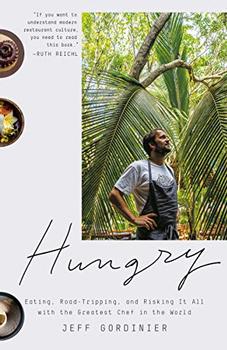Summary | Excerpt | Reviews | Beyond the book | Read-Alikes | Genres & Themes | Author Bio

Eating, Road-Tripping, and Risking It All with the Greatest Chef in the World
by Jeff GordinierNoma, René Redzepi's restaurant in Copenhagen, Denmark, has widely been considered among the best in the world, coming first in Restaurant magazine's rankings four times between 2010 and 2014. In 2013, though, it dropped to second place when some bad mussels led to a norovirus outbreak that affected dozens of customers. Redzepi wanted to shake things up and rebuild Noma's reputation for culinary innovation, so in the four years following the setback he opened pop-up restaurants in Tulum, Mexico and Sydney, Australia. Journalist Jeff Gordinier, the food and drinks editor at Esquire, went along for the ride, and reports on the Noma team's adventures, while also painting a portrait of this charismatic, driven chef. The result is a captivating hybrid of travelogue and biography, with a deep dive into the culinary cutting edge.
Redzepi built Noma around two core ideas: foraging for local ingredients, including some most of us won't have heard of, and transforming them through the science of molecular gastronomy (for example, one of the Copenhagen staff members has the title "director of fermentation"). "Somehow Redzepi brings out the stark beauty in his foraged, fermented, smoked, and salvaged ingredients, and, perhaps even more impressively, he makes you want to pick them up with your fingers and place them on your tongue," Gordinier marvels.
Sticking with the extreme locavore approach meant that, wherever Redzepi and his team went, they had to find local experts who could lead them to the best ingredients and teach them how to prepare traditional dishes. In Mexico, one goal was to learn how to make perfect tortillas. Another was to explore the huge variety of flavors that go into making mole, the sauce that is considered Mexico's national dish. In Sydney, locals helped them forage for seafood, wild celery and figs, and pink peppercorns.
Taking inspiration from indigenous cooking, the pop-ups aimed for food that was at the same time traditional and utterly new. "Success meant this: a meal that had never been eaten on earth, one that tasted simultaneously contemporary and ancient," Gordinier notes. Redzepi himself is a product of cultural fusion: his mother is Danish and his father was an Albanian Muslim from Macedonia. The chef also employs a diverse team, with the new Noma pastry chef an African-American from the Bronx. German, Danish, and Japanese chefs joined him to work on the pop-ups, and he has further acolytes all over the world. Yet the international scope of the ventures never cancels out the team's respect for local food traditions.
Gordinier depicts Redzepi as someone who is always chasing novelty: he "isn't comfortable with stasis; he's allergic to inertia." Every week at Noma he tasks his staff with creating something new via the Saturday Night Projects, and he challenges himself physically, too; he hired a trainer to create "the Workout," an arduous fitness regime meant to counterbalance all the rich foods a chef consumes. He also enjoys theatrical gestures, which is appropriate given that a restaurant meal is like a one-time performance: "when it's gone, it's gone."
It's fitting, then, that Hungry uses a number of musical analogies to convey the innovative and at times improvisational nature of Redzepi's cuisine. "Noma was like a band that had tasked itself with writing a new song every day, just to see what would happen," Gordinier writes; elsewhere he likens Redzepi to "Glenn Gould doing the Goldberg Variations, reimagining the intricate counterpart of Bach."
It's slightly hard to stay oriented in the book's four-year chronology, especially because it opens in Mexico and returns there after interludes in Denmark, Australia and more. Perhaps a timeline or dated chapters would help with that slight confusion leading up to the grand opening of Noma 2.0 in 2018. For foodies, this slim volume is a brisk, delightful tour through world cuisine, as well as a shrewd character study of one of the new breed of celebrity chefs (see Beyond the Book). Redzepi "comes across as a man with a mission, and his overriding manifesto might boil down to this: Look more deeply. There is so much around us to relish."
![]() This review was originally published in The BookBrowse Review in July 2019, and has been updated for the
August 2020 edition.
Click here to go to this issue.
This review was originally published in The BookBrowse Review in July 2019, and has been updated for the
August 2020 edition.
Click here to go to this issue.

If you liked Hungry, try these:

by Carolyn Phillips
Published 2021
Part memoir of life in Taiwan, part love story―a beautifully told account of China's brilliant cuisines…with recipes.

by Isabel Vincent
Published 2017
A nonagenarian and a recently divorced reporter meet weekly for dinner, and the discussion ranges from the importance of beauty, to living after loss, to the power of love to redeem and renew, to how to make a succulent duck breast.
Your guide toexceptional books
BookBrowse seeks out and recommends the best in contemporary fiction and nonfiction—books that not only engage and entertain but also deepen our understanding of ourselves and the world around us.